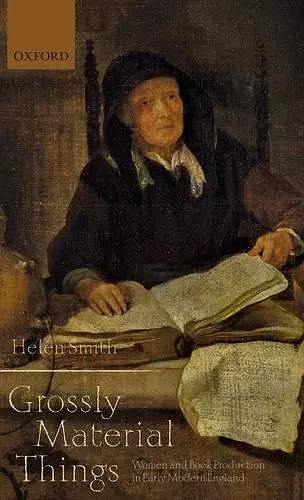'Grossly Material Things'
Women and Book Production in Early Modern England
Format:Hardback
Publisher:Oxford University Press
Published:3rd May '12
Currently unavailable, and unfortunately no date known when it will be back

In A Room of One's Own, Virginia Woolf described fictions as 'grossly material things', rooted in their physical and economic contexts. This book takes Woolf's brief hint as its starting point, asking who made the books of the English Renaissance, and what the material circumstances were in which they did so. It charts a new history of making and use, recovering the ways in which women shaped and altered the books of this crucial period, as co-authors, editors, translators, patrons, printers, booksellers, and readers. Drawing on evidence from a wide range of sources, including court records, letters, diaries, medical texts, and the books themselves, 'Grossly Material Things' moves between the realms of manuscript and print, and tells the stories of literary, political, and religious texts from broadside ballads to plays, monstrous birth pamphlets to editions of the Bible. In uncovering the neglected history of women's textual labours, and the places and spaces in which women went about the business of making, Helen Smith offers a new perspective on the history of books and reading. Where Woolf believed that Shakespeare's sister, had she existed, would have had no opportunity to pursue a literary career, 'Grossly Material Things' paints a compelling picture of Judith Shakespeare's varied job prospects, and promises to reshape our understanding of gendered authorship in the English Renaissance.
Smith has produced a study that argues convincingly for the integral engagement of women with the materiality of the printed text. The strength of this work comes from the wealth of illustrative examples placed within a convincing discussion of the many facets affecting the production and use of early modern books. * Jessica Malay, Women's History Review *
Far from mere handmaids to their more accomplished male contemporaries, the early modern women who people this extraordinary book are revealed not only as patrons, printers, and translators of male-authored works, but also as stationers, chapwomen, and active readers who shape those works' very meanings. A welcome corrective to the familiar emphasis on prescriptive literature, Smith's work immerses us in the dirty, noisy world of early modern England where men and women jostled for position in the burgeoning economy of London and beyond. * Christina Luckyj, Early Theatre *
brings a wealth of new insights to the field of book history * Alice Eardley, Journal of the Northern Renaissance *
Smith's emphasis on materiality certainly alerts us to some tantalizing glimpses of the place of women in both printing houses and Stationers' Hall. * Maureen Bell, Times Literary Supplement *
Smith presents a meticulous study of the participation of women in all aspects of book production ... the volume may prove useful to anyone researching the social, economic, and intellectual composition of the book trade. * N.C. Aldred, The Library *
Helen Smith's fascinating Grossly Material Things opens an important window onto the basic circumstances of the Renaissance printing house and sheds new light on the significant roles women played in early modern Englands print marketplace ... Combining elegant writing with an abundance of useful details, Smith's study demands that we pay greater attention to the colophons of our favorite Renaissance books ... When others explore the role of women in the production of books in other markets, those scholars would do well to take Helen Smith's book as a model. * Andrew Fleck, Renaissance Quarterly *
Helen Smith's Grossly Material Things is a fascinating, insightful, superbly researched book on the contributions women made to manuscript and book production in the Early Modern period. Anyone interested in the history of reading or of the book will learn a great deal from her investigation ... The great strength of her work is to refocus our attention on the web of gendered relations in writing, translating, patronizing, publishing and reading in this period. * Tom Rooney, Early Modern Literary Studies *
Smith prods scholars to widen their definitions of textual labor to include books' physicality - an unexamined aspect of their cultural and intellectual impact. * Kathryn Narramore, Textual Cultures: Texts, Contexts, Interpretation *
This ambitious, well-researched, and timely study sets out to revise our understanding not only of early modern women's roles in book production (as its subtitle promises) but also of their myriad contributions to the entire communications circuit, including the commissioning, manufacture, distribution, and consumption of print publications in England, and between England and the Continent ... it will be of interest to a wide array of readers including, but not limited to, specialists in book history. * Natasha Korda, Joural of British Studies *
This monograph will be indispensable for early modern book historians as well as scholars of women's writing in the sixteenth and seventeenth centuries. * Gillian Wright, SHARP News *
- Winner of Winner of 2013 Bainton Literature Prize; Winner of 2013 SHARP DeLong Book History Prize.
ISBN: 9780199651580
Dimensions: 221mm x 148mm x 21mm
Weight: 466g
270 pages